OKRs are crucial because they provide a framework for setting and achieving goals. By defining clear objectives and measurable key results, OKRs help align efforts towards a common purpose, increase transparency and accountability, and enable teams to focus on the most crucial initiatives.
An ideal OKR tool should have the following characteristics:
- User-friendly interface: The tool should be easy to use and navigate, with clear instructions on how to set up and track OKRs.
- Customizable: The tool should allow users to customize their OKRs to fit their needs and objectives, including setting individual, team, and company-wide goals.
- Real-time updates: The tool should provide real-time updates on progress towards key results, so teams can quickly adjust their efforts and strategies as needed.
- Collaborative features: The tool should enable collaboration between team members, allowing feedback and support to be given and received.
- Integration with other tools: The tool should integrate with other tools that the teams are already using, such as project management software or calendars, to streamline the goal-setting process and make it easier to track progress.
Leapsome is one such highly effective performance management platform that helps organizations engage their employees. It offers features such as OKRs, feedback, and performance reviews to improve employee performance. Leapsome help teams set and achieve their objectives with greater efficiency and effectiveness but is it the only best tool out there?
There are several performance management tools available as alternatives to Leapsome, including Peoplebox, Perdoo, Workboard, etc. Each offers unique features and benefits, like goal setting, continuous feedback, and performance analytics. It’s important to carefully evaluate each option to determine which tool best meets your needs.
In this blog, we will explore the top 6 alternatives to Leapsome. So, let’s dive right in.
What is Leapsome?
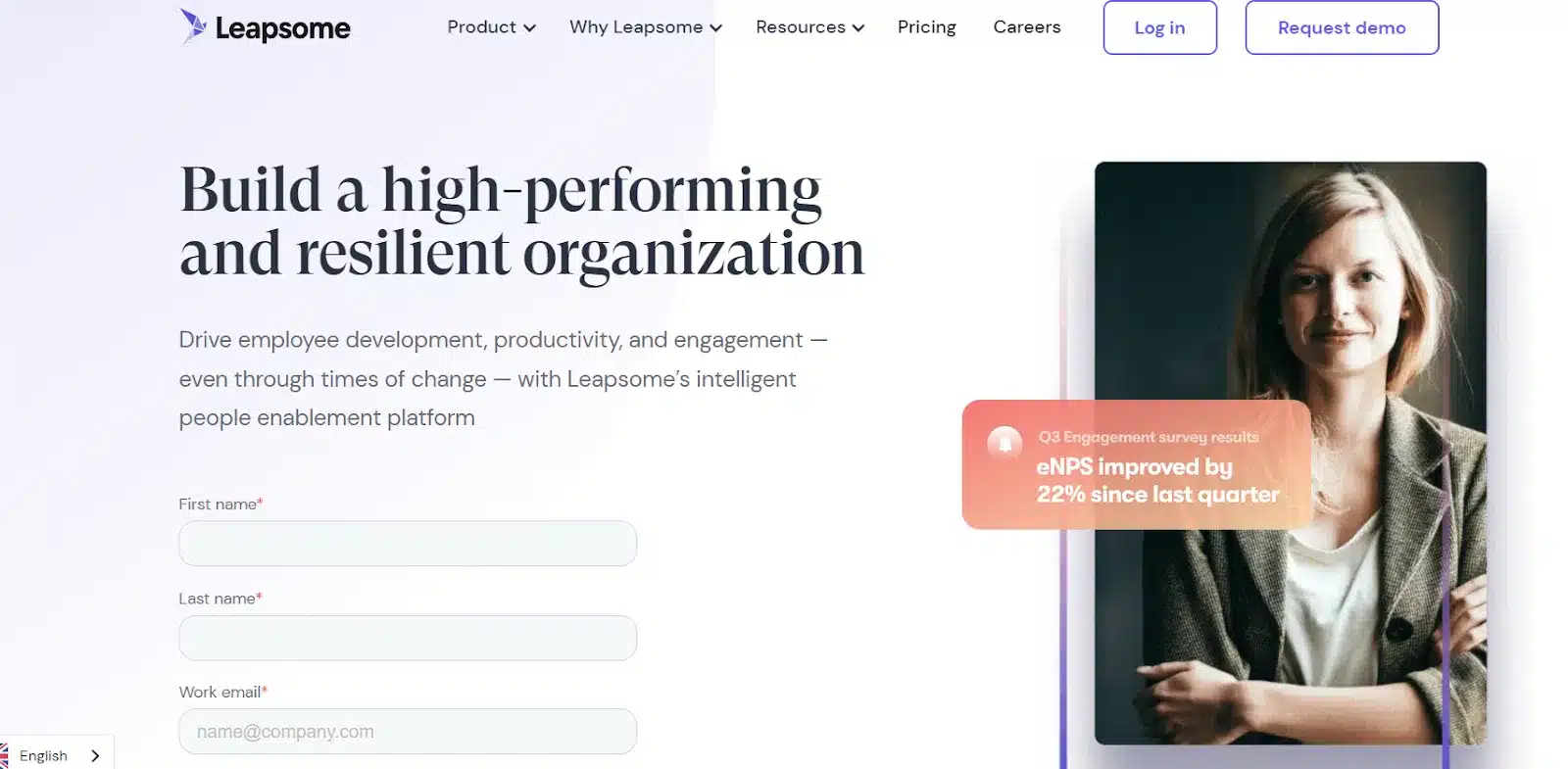
Leapsome is an agile performance management platform designed to help organizations align, develop, and engage their employees. It offers features such as goal setting, continuous feedback, performance reviews, and employee engagement surveys, all in one intuitive platform. Leapsome helps managers and HR professionals improve employee performance and drive business success by providing real-time insights and actionable feedback.
Pros of Leapsome
- Leapsome is user-friendly and intuitive. Its comprehensive instructions on platform usage make it easy for employees and managers to use it.
- Leapsome provides a high level of customization, enabling businesses to personalize the platform according to their unique requirements and objectives. With several modules and features available, organizations can adapt Leapsome to fit their distinct business models and workflows.
- It offers an effective feedback tool integrated with Slack for convenient use and provides actionable insights.
Cons of Leapsome
- Leapsome becomes difficult to use for new users. It requires onboarding and training for users to comprehend the OKR methodology and operate Leapsome proficiently. The lack of this leads to dissatisfaction and reduced adoption rates.
- Leapsome does not provide support for many project management or analytics tools.
Top 5 alternatives of Leapsome
1. Peoplebox
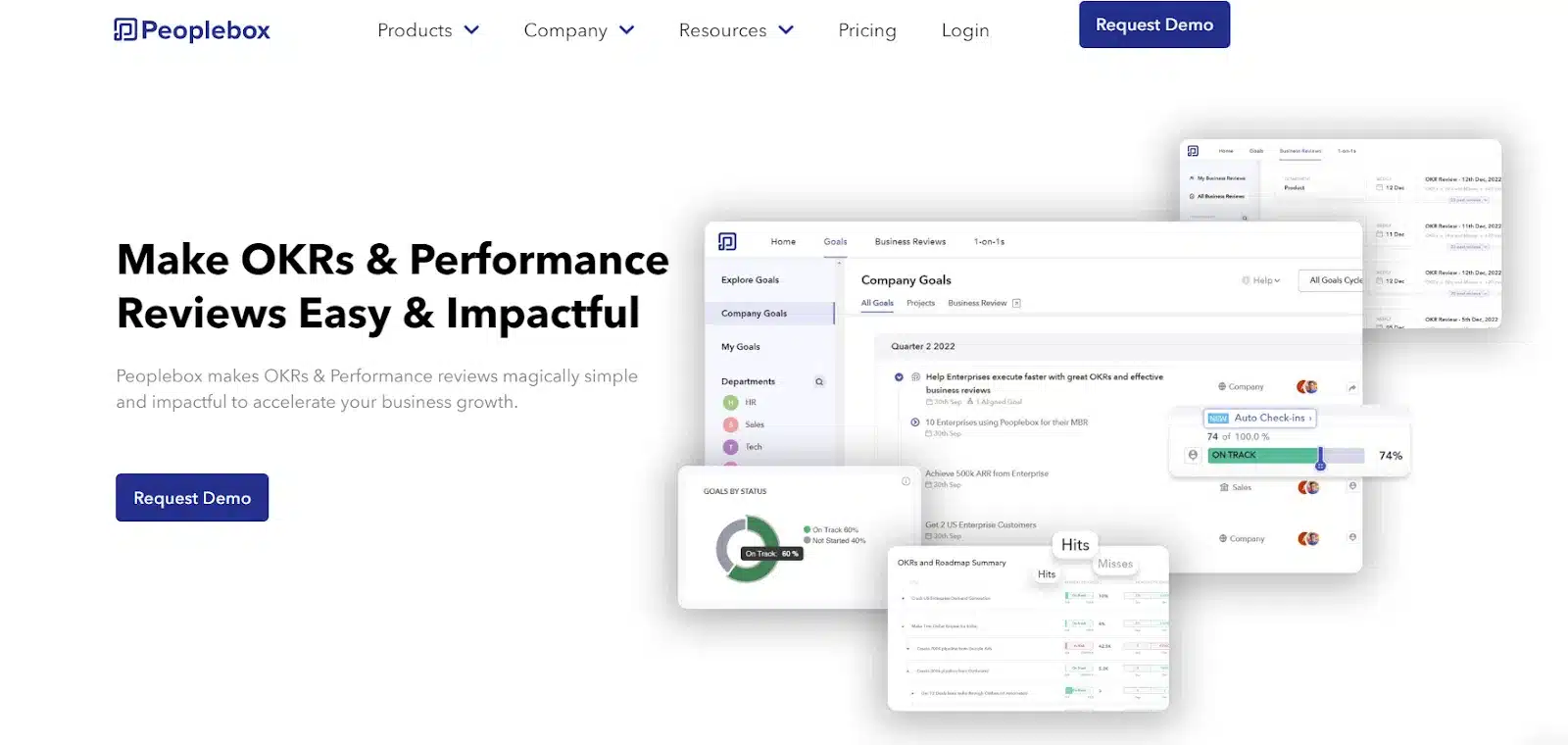
Peoplebox is an enterprise-level OKR and performance management solution that aims to build an outcome-driven culture and achieve goals. This platform is popular among HR leaders who want to align, track, and achieve their strategic priorities and cross-functional goals.
It integrates various work tools such as SQL, Jira, Hubspot, Asana, and more, which makes aligning and tracking goals, business review meetings and performance review effortless. Trusted by over 500 leading companies, including Razorpay, Veriff, Disney, Postman, Khatabook, and Exotel, Peoplebox is backed by Y Combinator.
Razorpay Case Study: How Razorpay executes strategy faster with Peoplebox
Khatabook Case Study: How Khatabook streamlined their performance reviews
Notable Features
1. Real-time updates
You can track OKRs in real time with Peoplebox. It provides you with a single overview of the strategic priorities, helps in tracking the performance, projects, and initiatives, and keeps a close eye on KPIs.
2. Performance Review entirely on Slack
Peoplebox offers a 360-degree review module that enables you to manage auto-updating OKRs and KPIs, scheduling 1:1s for data reviews, and customizing the review process. The platform handles everything from self-reviews, peer selection and reviews, nudges and reminders, goal check-ins, and tracking the performance review process. It also provides a performance review dashboard, reviews summary reports and allows users to track the entire process. The best part is that you can manage this entirely from Slack.
3. KPI board
The KPI Board feature simplifies the process of integrating OKRs and KPIs into your business review meetings, making it easy to review and allowing more time to tackle challenges. It also enhances the team’s ability to execute strategic goals and achieve better outcomes.
4. Business Reviews with Customizable Dashboards
Business review dashboards can be customized according to your needs with Peoplebox. You can add KPIs, charts, narrations, action items, and other details to automatically track OKR progress. This feature allows for effective weekly and monthly business review meetings, helping teams identify potential roadblocks in advance and focus on finding solutions.
5. 100+ native tools integration
It offers seamless integration with over 100 native tools such as Slack, Jira, Asana, MySQL, Google Sheets, and Salesforce. This enables auto real-time updates of your goals with these integrated tools, and you can customize auto-populated dashboards for your weekly check-ins and business reviews.
6. Single-page application
It is a single-page software designed to provide a comprehensive overview of company goals, team tasks, individual performance, progress reports, and charts. The UI is simple but effective, and easy to navigate and use.
Pros of Peoplebox
- Peoplebox is an all-inclusive platform that encompasses various functionalities such as OKRs, Business Review Meetings, KPI Tracking, complete performance management, and employee engagement.
- Peoplebox has a strong focus on making OKRs, the core of its approach, which results in increased effectiveness, faster strategy execution and the creation of an outcome-driven culture.
- Its 1:1 meeting feature is very helpful in facilitating regular check-ins with team members and keeping everyone on the same page.

- They offer resources and guidance for managers like to improve their management skills and build a more productive and positive team culture.
Cons of Peoplebox
- While it enables users to create objectives and key results in any language, its language support is restricted to English only as of now.
2. Quantive (Formerly GTMhub)
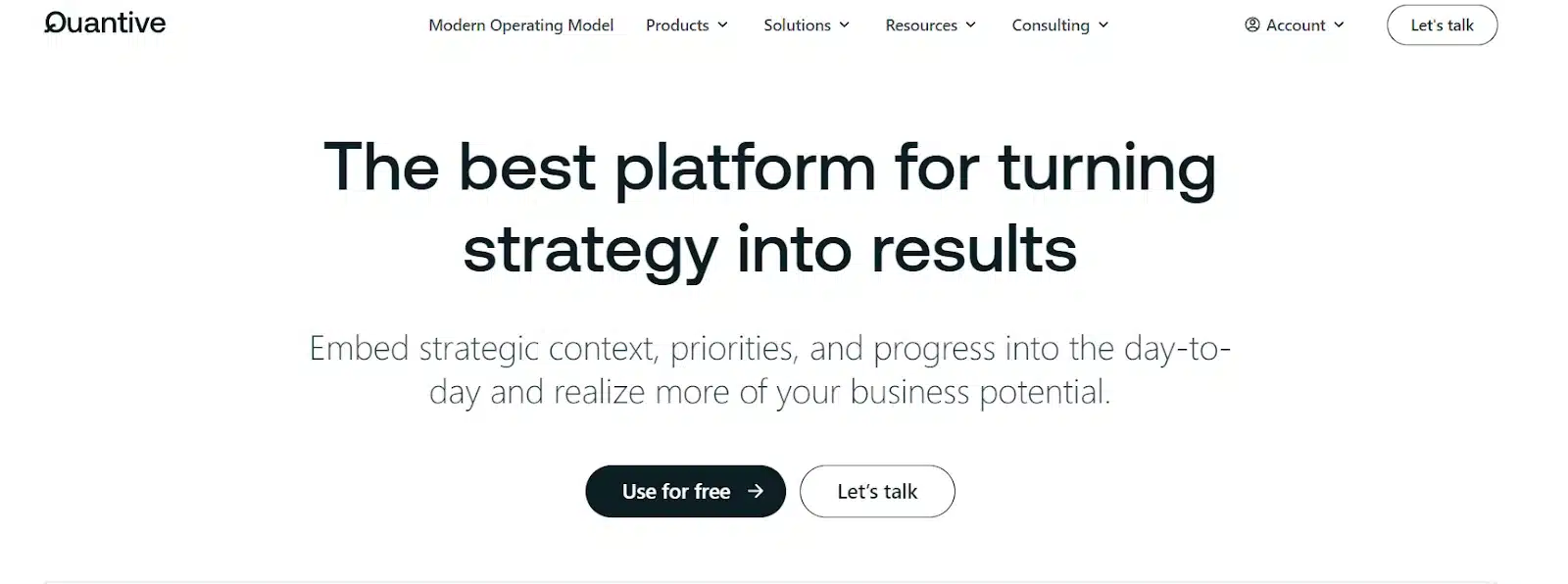
Quantive is a cloud-based OKR software platform that helps organizations set, track, and manage their goals. It offers features such as real-time progress tracking, custom dashboards, and integrations with other business tools. Quantive aims to simplify the OKR process and help teams focus on what matters most to achieve their goals.
Notable Features
1. Strategy Execution
Quantive offers purpose-built OKR software that enables teams to quickly plan, align, activate, execute, and evaluate their strategies for optimal performance.
2. Business monitoring
Quantive enables businesses to leverage applied intelligence to gather, identify, analyze, and automatically monitor KPIs and notifies you with intelligent alerts, explaining what, when, and why something unexpected occurs.
3. Operating Model
It offers integrating strategy, teams, and data through its Modern Operating Model feature which enhances decision-making streamlines operations and generates superior business results.
Pros of Quantive
- Quantive offers customizable alerts and notifications, allowing users to choose the most relevant information to their business needs, and receive timely updates.
- Quantive Signals provides advanced analytics and reporting tools, enabling users to analyze performance data, identify trends, and make informed decisions based on real-time insights.
Cons of Quantive
- Quantive has a steep learning curve, which could lead to frustration and reduced adoption rates.
- Quantive is highly innovative and agile. However, these contribute to some infrastructure capacity problems, resulting in occasional sluggishness, which requires manual refreshing or restarting to restore proper functionality.
3. Perdoo
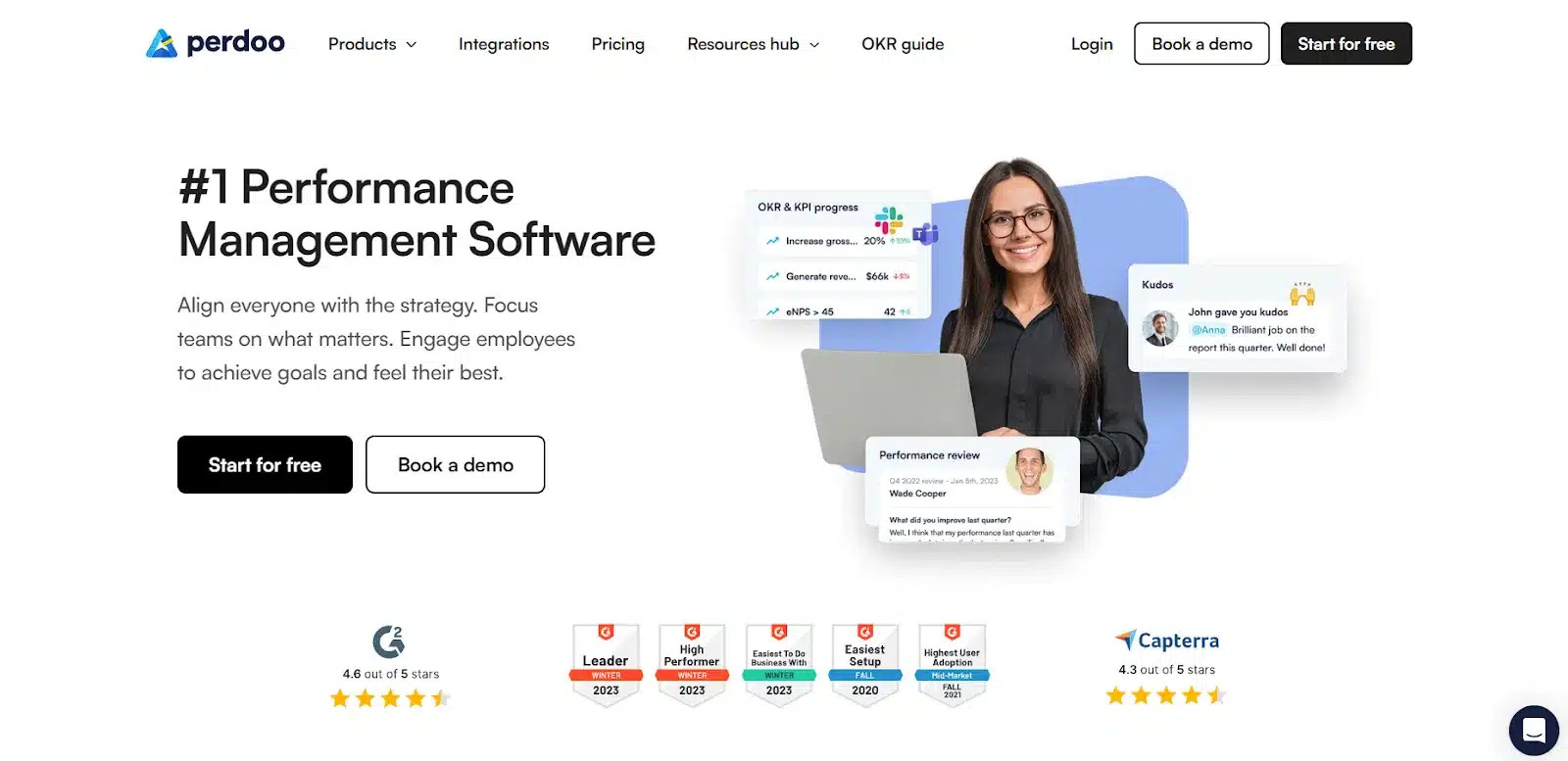
Perdoo is a cloud-based performance management software platform that enables organizations to set, track, and achieve their goals. It offers a range of features, including customizable dashboards, goal alignment, progress tracking, and reporting capabilities.
Notable Features
1. Strategy
Perdoo enables you to simplify your strategy and eliminate static documents. It allows you to easily analyze past performance, make necessary adjustments, and design your plans with ease.
2. KPI board
Perdoo’s KPI board simplifies the process of planning, tracking, and delivering your KPIs, aligning everyone’s goals with the organization’s growth strategy. This feature streamlines KPI management, ensuring that teams are on the same page and working towards the same objectives.
3. User-friendly interface
Perdoo provides a user-friendly interface that allows teams to collaborate effectively, ensuring that everyone is working towards the same goals.
Pros of Perdoo
- It provides automated notifications and reminders to keep teams on track and engaged.
- Perdoo provides a high level of customization, enabling organizations to customize the platform to meet their specific requirements.
- Perdoo’s OKR Map is a visual tool that breaks down the company’s vision into strategic pillars and OKRs, making it easier to understand and visualize.
Cons of Perdoo
- It can sometimes be difficult to gain a complete picture of the strategy or roadmap, and users may need to zoom out to see the entire map in Perdoo.
- Although Perdoo offers helpful hints and information to aid users in understanding OKRs, new users may require some time to adapt to the interface.
4. Workboard
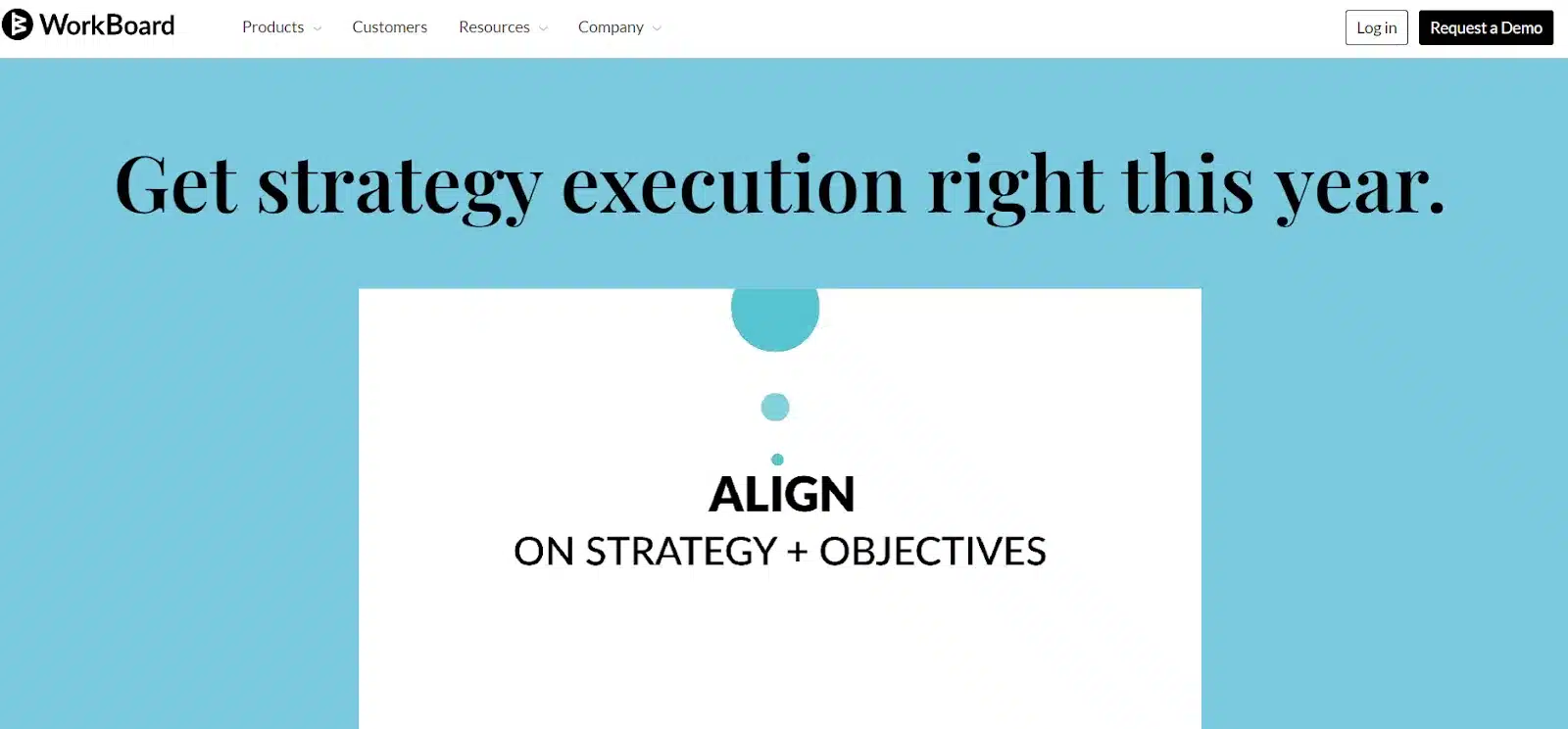
Workboard is a cloud-based tool that efficiently manages OKRs and enhances daily operations to accelerate goal attainment. It offers several features such as progress tracking and team collaboration tools that enhance productivity, accountability, and performance while keeping the organization aligned and focused.
Notable Features
1. OKR Canvas
Workboard simplifies the process of setting objectives through its OKR Canvas feature. It helps in setting the right OKRs by providing guidance and recommendations, allowing for collaborative brainstorming with the team to establish measurable goals.
2. Wobo Strategy
The strategy feature of Workboard enables businesses to create long-term plans for their organization, products, and key initiatives spanning over several years. These plans can be shared with everyone, and the platform allows monitoring progress, ensuring the plan is comprehensive, covers all vital aspects, and considers potential risks and investments required.
3. My OKRs
Workboard provides a straightforward way to link and align OKRs within an organization, both vertically and horizontally across teams and individuals. Users can easily access relevant OKRs for a product, team, or individual through the “My OKRs” page.
Pros of Workboard
- Workboard’s OKR Canvas feature ensures that objectives are well-prepared, attainable, and aligned with the company’s overall strategy.
- Workboard simplifies progress tracking and automatically calculates progress towards target outcomes, making it easy to measure progress transparently.
- It allows Key results to be updated through the Web, mobile, or chat, and teams can add confidence ratings and qualitative assessments to improve their performance.
Cons of Workboard
- The platform’s extensive range of features can sometimes lead to slow performance and periods of downtime, which can disrupt the user experience and work processes.
- While WorkBoard’s platform is robust and feature-rich, it may occasionally compromise ease of use.
5. Unlock OKR
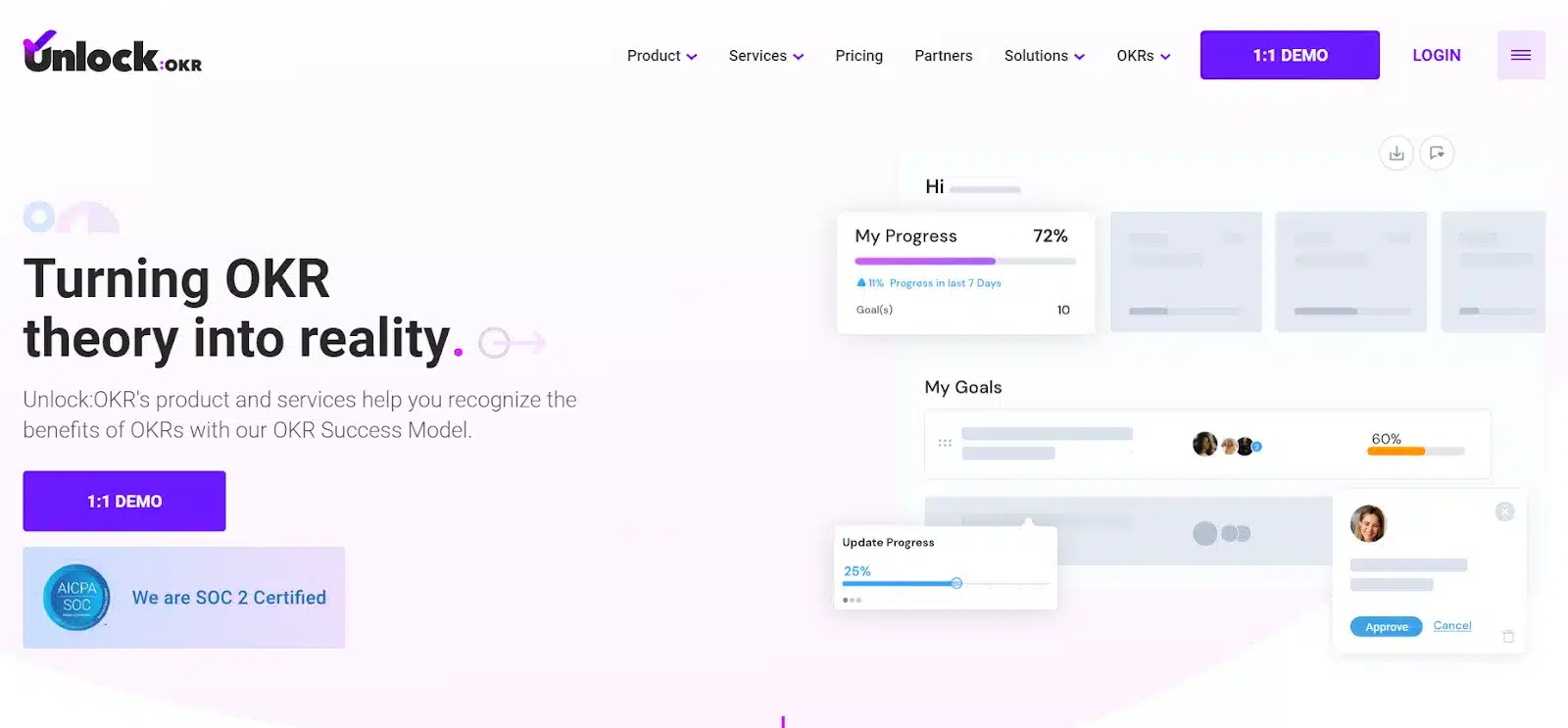
Unlock OKR is an OKR software that helps organizations manage and achieve their goals effectively. The platform provides various features, such as customizable dashboards, progress tracking, and insights into performance trends. Unlock OKR also offers a variety of templates to help organizations get started with OKRs quickly.
Notable Features
1. Alignment
Unlock OKR enables teams to align around common goals and objectives. The platform provides a shared space for team collaboration and communication, making it easier to work towards shared goals.
2. Customizable templates
Unlock OKR provides customizable templates that help users get started quickly. The platform offers a variety of templates for different industries and business functions, making it easy to get started and customize the tool to fit specific needs.
3. Insights
OKR provides CEOs, managers, and individual contributors with immediate access to practical insights through role-specific dashboards that can be further customized based on the organization’s distinctiveness.
Pros of UnlockOKR
- UnlockOKR offers a customizable role-based dashboard that provides real-time insights to all members of an organization.
- Unlock OKR offers an intuitive and user-friendly interface and claims that users can start using it immediately without requiring extensive training.
Cons of UnlockOKR
- Compared to other tools available in the market, Unlock OKR may at times lack task intuitiveness.
- UnlockOKR can be slow and buggy at times, causing frustration and disrupting workflows.
Final Words
While Leapsome is a popular performance management tool, it’s always worth considering other options to see which one fits your company’s needs the best. Peoplebox, Workboard, UnlockOKR, Perdoo and Quantive are all great alternatives that offer unique features and benefits that can help your company achieve its goals. By weighing the pros and cons of each tool, you can make an informed decision and implement a performance management solution that suits your company’s culture, goals, and vision.








